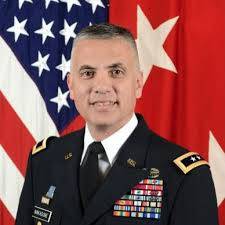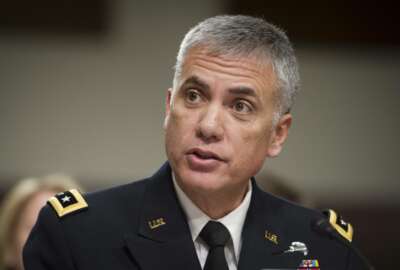
Military seeks seasoned industry professionals as next cyber warriors, but they’ll have to start at the bottom
A few months into the Army's pilot program to directly commission cyber officers, Lt. Gen. Paul Nakasone says entry-level pay isn't cutting it.
Subscribe to Federal Drive’s daily audio interviews on Apple Podcasts or PodcastOne.
The likely next commander of U.S. Cyber Command told Congress last week that a pilot program lawmakers established to recruit more seasoned cyber experts into the military’s uniformed workforce is making some headway. But, he strongly suggested it’s been hampered by its inability to commission new officers at ranks that are commensurate with their experience.
Lt. Gen. Paul Nakasone, currently the commander of Army Cyber Command, was referring to the direct commissioning pilot program lawmakers authorized as part of the 2017 Defense authorization bill, letting all of the military services onboard new officers in cyber specialty areas after about 18 weeks of military training.
The Army began implementing its program in December, but said the first inductees would be commissioned as lieutenants, irrespective of the skills and experience they’d already amassed in the private sector.
“What we have seen in the Army is we need greater constructive credit,” Nakasone said at his confirmation hearing Thursday. “So, if you are a high-end big data or forensics malware analyst, being able to get more credit for that service to bring you in at a higher rank will allow us to probably bring in higher level of talent. This is an early program. We’ve only started it within the past 90 days, but that’s the early results that we’ve seen.”
The Navy, however, has had a similar program in place for much longer, based on an earlier authorization from Congress.
The Navy first announced it would begin direct commissioning of civilians into its Cyber Warfare Engineer career field in 2010, but it’s recruited just 25 new officers via that route since then, according to a spokesman for the Navy’s Fleet Cyber Command. That’s compared to the 30 new officers who are expected to become CWEs after graduating from the U.S. Naval Academy in 2019 alone.
Like the Army, the Navy’s program initially commissions officers as O-1s (ensigns), regardless of their outside experience. As of 2018, basic pay at that rank is just over $37,000 per year, not including housing and other cash allowances.
Vice Adm. Robert Burke, the chief of naval personnel, indicated at a Senate hearing in January that those pay rates are nowhere close to competitive with what people of the caliber the military is seeking are currently earning in industry.
“These [CWEs] are the folks that write the software, do the coding for the offensive operations, and they’re very much in high demand within other government organizations as well as in the civilian community,” he said. “You gave us some relaxed authority to give three years of constructive credit, but that’s still kind of O-1 to O-3 pay, which still leaves them in the mid-$40,000 initial salary range, give or take. And what we’re finding is those folks are in high demand elsewhere, and they’re being hired in the hundreds of thousands of dollar-a-year salary range.”
The Navy has long expressed interest in recruiting new officers from the private sector in something that more closely resembled a lateral entry program which would not require highly-skilled cyber professionals to start their military careers at the bottom. It had previously asked Congress to let it directly commission the new officers at ranks all the way up to captain (O-6).
“I think it would mean a lot to us operationally to be able to recognize people’s expertise, because right now, when we’re doing operations, the rank someone’s wearing on their collar might not have much of a correlation with how much expertise or ability they’re delivering in our cyber operations,” Vice Adm. Jan Tighe, the deputy chief of naval operations for information warfare, said in 2016. “We need to resolve that, either with incentives or promotions or rewards, or bringing them in at the right level to begin with. I think there’s a lot of opportunity there for us.”
Read more of the DoD Reporter’s Notebook.
Copyright © 2025 Federal News Network. All rights reserved. This website is not intended for users located within the European Economic Area.
Jared Serbu is deputy editor of Federal News Network and reports on the Defense Department’s contracting, legislative, workforce and IT issues.
Follow @jserbuWFED





